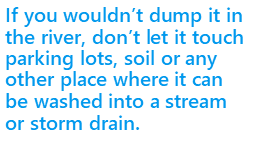Household Hazardous Waste
Cleaning out the garage and keeping our waters clean
We all have the opportunity – and the responsibility – to dispose of waste materials properly. The rule of thumb is: If you wouldn’t dump it in the river, don’t let it touch parking lots, soil, or any other place where it can be washed into a stream or storm drain. Post this sheet in your garage storage area as a reminder. This will help us change one habit at a time, so we have good fishing, swimming, paddling and water-skiing when the work is done.
Harmful Substances
Certain household chemicals, when not used up properly, become household hazardous waste. These products can contain the same chemicals as strictly
regulated industrial wastes. These products include: cleaning products and wash water, food oils and grease, automotive oil, grease and waste fluids, paint, petroleum-based solvents, rodent baits, batteries, herbicides, pesticides, concrete wash water and sidewalk salt.
Handle with Care
To avoid the potential risks associated with household wastes, always monitor the use, storage and disposal of products with potentially hazardous substances.
Proper Disp osal
osal
All of the counties in Northeast Wisconsin have Household Hazardous Waste drop off programs or collection days. Contact your local environmental, health or solid waste agency for instructions on proper use and disposal.
Using Less
The quantity of waste from a single household may be small, but that quantity adds up fast considering the number of households in Northeast Wisconsin. Consider reducing your purchase of products that contain hazardous ingredients.
Stormwater is rain or snowmelt and water from things people do, like overwatering the lawn or discharging pool water into the street drain. We can choose products carefully and shape our lawns and pavement so water sinks in. When we do, runoff is reduced, pollutants filter out and streams and groundwater are protected.
Untreated runoff is the biggest threat to our nation’s water quality, according to the U.S. Environmental Protection Agency. Let’s make the small, important changes that will reduce that threat and improve water quality and our lives!
